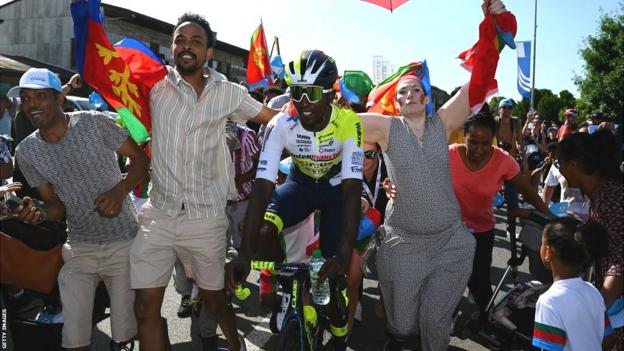Under a stifling hot Swiss sun, Biniam Girmay rests his forearms on his handlebars, his muscular right leg out at an angle to stabilise himself as he gives pre-race interviews.
He’s no different to any other rider cruising slowly through the gauntlet of microphones on bikes worth around £15,000 – like thoroughbreds on parade.
But, Eritrean Girmay is one of only six black African riders in the top-level World Tour peloton of 534, overwhelmingly white riders.
Girmay’s real distinction though is as one of the finest talents in the sport. Last year he made history as the first black African to win a one-day cobbled classic – in Gent-Wevelgem – and a stage of cycling’s second biggest Grand Tour race – the Giro d’Italia .
And he’s exciting to watch. Girmay is a Mark Cavendish-style sprinter, who wins on flatter or mildly hilly stages.
The 23-year-old is in picturesque Tafers, a wealthy Swiss village surrounded by lush Alpine meadows. It is the start line for the third stage of the Tour de Suisse: a crucial warm-up race for the Tour de France, where the whole world may see Girmay break more new ground as the first black African to win a stage of cycling’s greatest race.
“I can’t imagine…” he says through mirrored shades and a big smile. “I don’t know how big it is for us to win a stage of the Tour de France as an African rider – it would be amazing.”
Part of the reason Girmay speaks of ‘us’ could be seen the previous day. He took his first Tour de Suisse stage win, triumphing in a high-speed bunch sprint.
As he crossed the line, a gaggle of Eritreans surrounded him, draping him in the country’s flag whilst running alongside his still-moving bike, chanting his name. One even held an umbrella above his head. If they could bear him back to the team bus on a Sedan chair, they just might have.
The significance of Girmay’s talent, and what might follow, is intriguing. Many believe his success will spark change in a sport lacking in diversity. Africa’s success in the sport could change; it could become a continent that produces not just riders, but winners.
Two of the six black African riders in the World Tour peloton are from neighbouring Ethiopia, but the rest, like Girmay, are Eritrean.
That is one very small (a population of about 3.7m) and poor (13th lowest in the World Bank’s global rankings of GDP per capita) nation, punching above its weight on a continent of 1.2bn people.
Girmay is a family man who has shunned the typical professional cyclist’s path to a life in Andorra or Monaco. He still lives in Asmara – Eritrea’s capital. It’s a city, and Eritrea a country, which has the bicycle woven into its culture, thanks in part to more than 50 years of Italian colonial rule.
“Cycling is in our blood,” adds Girmay. “The first time I rode a bike? I don’t know. I was really, really small – aged three. Really small.”
“Cycling is like football in our country. I like Lionel Messi, but I choose Biniam Girmay,” says one Eritrean fan nearby.
“It is our culture,” says another, as more and more gather, some with children no more than two years old, circling us on their tiny balance bikes.
“We grow every single kid with a bike. Their first gift is a bike – we use it as transport to go to school, go to work… every single person has a bike. If you visit Eritrea you will see it.”
And that’s the real trick. Eritrea is difficult, almost impossible for many westerners to get to. It is a highly-militarised one-party state which has been led by President Isaias Afwerki for 30 years.
The population is subject to compulsory decades-long military service and government control of many parts of their lives. It is sixth from the bottom of the World Press Freedom Index, which measures the independence of the world’s media.
Eritrea was at war with neighbouring Ethiopia in 2000 – the year that Girmay was born in Asmara. That tension has lingered throughout his and his five siblings’ childhood.
Conflict in Tigray, a breakaway Ethiopian region that borders Eritrea, draws in the country’s troops to this day.
“In 2020 all of my friends went to war,” says Selam Amha Gerefiel, a cyclist from Tigray.
“Some of my friends died, some friends who lived – some riders – lost legs, or arms. It’s difficult, so I couldn’t stay there.
“I had one friend – I enjoyed my time with him – every day we were training; every day going to the coffee shop; we go everywhere and I lose him because of the war.
“I can’t stay close to people; I get close to people, then they die.”
Gerefiel got out and is now part of the UCI’s World Cycling Centre (WCC). Based an hour from Tafers, cycling’s world governing body’s flagship facility is flanked by snow-capped mountains and a crystalline blue river.
Gerefiel’s story is heart-breaking, and not an easy one for her to recall over quinoa and pan-seared sea bass in the Centre’s restaurant, just one table away from where president David Lappartient entertains guests.
It’s incongruous to put it mildly. But there is an open-door policy in Aigle-Martigny, where the WCC is dedicated to housing athletes who simply cannot thrive without a safe environment.
“I am the second-oldest in my family, so I needed to go to war,” continues Gerefiel.
“But then I arrive here in Switzerland and it’s better, but mentally hard for me. When I go to training, I am on the bike but my mind is about my family, where they are, if they live or die… I didn’t know.
“When I go training on my bike, it feels better. I have a good feeling on the bike – it’s better than staying inside.”


